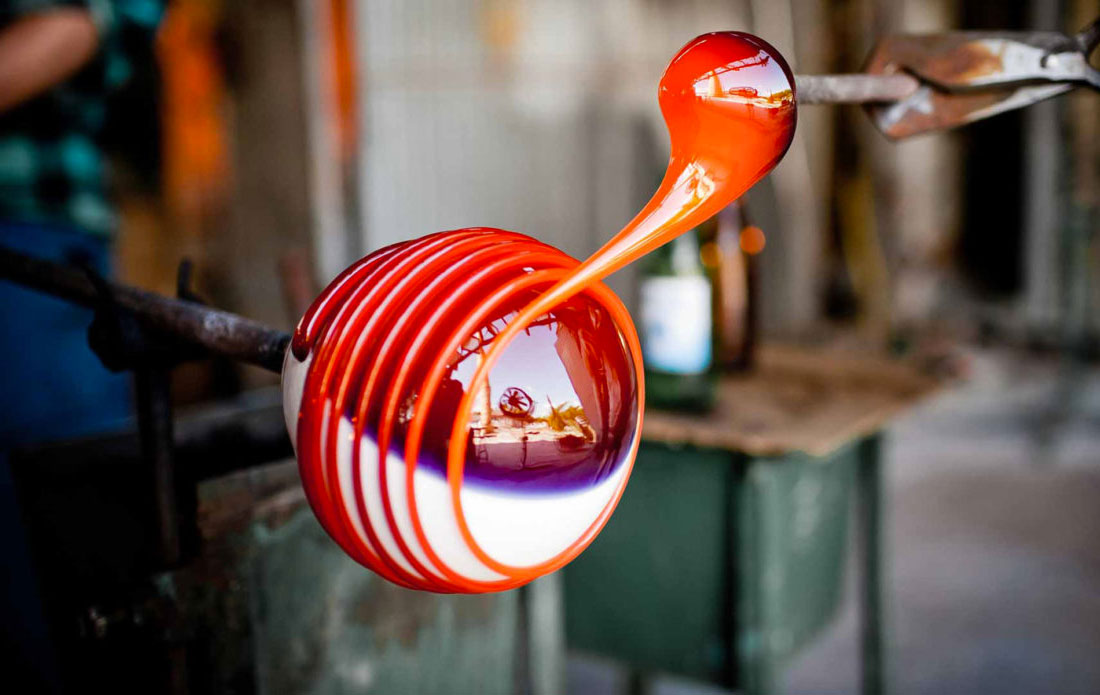Glass is one of the oldest known materials. Let's see what are the main stages in the history of glass, more than four thousand years long ...
The origins
Glass occurs naturally: it forms when quartz sand melts following a sharp rise in temperature and the melt subsequently cools. Such high temperatures are caused by lightning, but also by volcanic eruptions. It was precisely following a volcanic eruption followed by a rapid cooling that in prehistoric times man discovered the glassy material.
4.000 BC
According to an ancient legend narrated by Pliny the Elder, the history of glass begins with a chance discovery on the sandy banks of the Belo river, in Syria: here Phoenician merchants, to set up a camp hearth, used blocks of saltpetre which, melted by the heat and mixed with the sand, gave rise to the glass.
3.000 BC.
The Phoenicians spread the art of glass along the coasts of the Mediterranean in Syria, Cyprus and Egypt. Here a great variety of objects were produced using a compound similar to modern glass made with calcium carbonate.
1500 BC
The Egyptians began to produce the first hollow glass containers to be used as bottles for ointments, oils and perfumed essences.
300-200 BC
Glass production techniques changed profoundly in the Augustan age. The “so ffi o using cane” technique was invented, with which the glass masters could also produce glass objects of reduced thickness and of the most disparate shapes. Blowing replaced laborious hot casting processes.

100 BC
The first realizations of transparent glass artifacts date back to this era. The Romans were able to obtain transparency by inserting manganese dioxide into the glass mixture. The first geometric-shaped bottles were also invented, called Roman, true forerunners of modern bottles and that of the glass.
680 AD
The glass-making furnaces of which archaeologists found the remains in York, Great Britain, date back to this period.
XII-XIII century AD
In 1180 the first glass window made its appearance in England and in the following century the art of stained glass spread.
XV century AD
Thanks to its geographical position between Western Europe and the East, Venice became one of the most important glass centers. The glassmakers were forbidden to leave the island of Murano, to ensure that their secrets remained within the city.
Mid XNUMXth century
Several important inventions date back to this period, such as the barometer and lead glass. Table glassware, ornamental glass and optical lenses were born and scientific experiments began to be conducted in glass containers.
early seventeenth century
Glass production becomes industrial. Some factories are capable of producing up to one million bottles a year, although the bottles are still hand-made.
Early XNUMXth century
American Michael J. Owens invented the automatic bottle blowing machine. The blow molding machine is based on the suction method, which provides that the glass mass is sucked into the metal mold and automatically cut. With this technique it was possible to produce 2.500 bottles per hour.
Mid XNUMXth century
The history of glass continues with Saint-Gobain's development of tempered glass and the introduction of solar glass to the automotive market.
1952
Alastair Pilkington invented the process float glass, with the collaboration of Kenneth Bickerstaff. This method is today the world standard of glass production.
Today
Glass continues to play a primary role in various fields: in research, in architecture, in solar panels, in the chemical industry, in the food industry ... More and more efficient technologies for glass manufacturing make it possible to reduce the environmental impact of processing as well as the consumption of energy sources.



